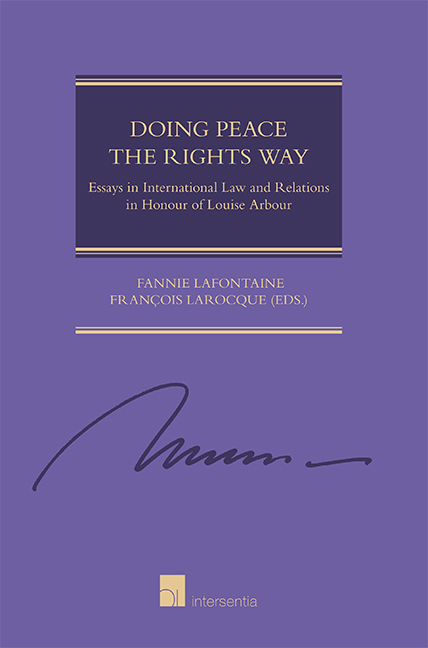Book contents
- Frontmatter
- Foreword
- Contents
- List of Contributors
- Introduction
- PART I OF FREEDOM AND EQUALITY
- PART II OF PEACE AND JUSTICE
- The Deterrence Rationale in a Criminal Justice Accountability Regime
- Peace and Justice: Human Rights Fact-Finding in Raging Conflicts
- “Exceptional Measures” in Times of Crisis: Terrorism, National Security and the Rule of Law
- When the End Lacks the Means: National Prosecutions of International Crimes and Canada's Paper Tiger Approach
- The Independence of International Prosecutors: Where Law Meets Realpolitik
- Torture, Jurisdiction and Immunity: Theories and Practices in Search of One Another
- Revisiting Challenges to International Humanitarian Law
- PART III OF WOMEN AND LEADERSHIP
- An Interview with the Honourable Madam Justice Louise Arbour
Torture, Jurisdiction and Immunity: Theories and Practices in Search of One Another
from PART II - OF PEACE AND JUSTICE
Published online by Cambridge University Press: 13 April 2019
- Frontmatter
- Foreword
- Contents
- List of Contributors
- Introduction
- PART I OF FREEDOM AND EQUALITY
- PART II OF PEACE AND JUSTICE
- The Deterrence Rationale in a Criminal Justice Accountability Regime
- Peace and Justice: Human Rights Fact-Finding in Raging Conflicts
- “Exceptional Measures” in Times of Crisis: Terrorism, National Security and the Rule of Law
- When the End Lacks the Means: National Prosecutions of International Crimes and Canada's Paper Tiger Approach
- The Independence of International Prosecutors: Where Law Meets Realpolitik
- Torture, Jurisdiction and Immunity: Theories and Practices in Search of One Another
- Revisiting Challenges to International Humanitarian Law
- PART III OF WOMEN AND LEADERSHIP
- An Interview with the Honourable Madam Justice Louise Arbour
Summary
INTRODUCTION
That the prohibition of torture has attained the status of a peremptory norm of international law has been beyond question for some time. The torture victim's right to civil redress is also generally uncontroversial and widely recognized in international law, as well as in the domestic law of certain states, either through specific legislative schemes, the general law of torts or obligations and, in many civil law countries, through the normal operation of the criminal law. More controversial, however, is the scope of the adjudicative jurisdiction of national courts with respect to civil claims for torture. It has been contended, at least since the 1990s, that national courts have the jurisdiction to adjudicate civil claims for torture, even in circumstances when the alleged torture has occurred in another country, that is, outside the territorial jurisdiction of the forum. More specifically, it has been argued that the universal criminal jurisdiction to prosecute individual torturers entails the recognition of a corresponding principle of universal civil jurisdiction to hold states and their functionaries liable for torture. A related question is whether this putative universal civil jurisdiction with respect to torture, like its criminal counterpart, is inimical to the application of immunities.
The idea that the peremptory prohibition of torture has given rise to a type of universal civil jurisdiction has found some acceptance in the literature, but does not yet form part of the mainstream. It might be that the impetus to fully theorize a putative principle of universal civil jurisdiction has been stifled by a consistent stream of national court rulings, since the 1990s, holding that the law of state immunity constitutes an absolute bar to civil claims for extraterritorial torture. The implicit conceit of these decisions appears to be that since acts of torture attract immunity, it is of little import whether national courts possess the adjudicative jurisdiction to entertain civil claims with respect to extraterritorial torture. It is noteworthy that almost none of these national court decisions even attempted to address the logically prior question of jurisdiction before dismissing the plaintiffs ‘ case on the basis of immunity.
- Type
- Chapter
- Information
- Doing Peace the Rights WayEssays in International Law and Relations in Honour of Louise Arbour, pp. 277 - 316Publisher: IntersentiaPrint publication year: 2019



